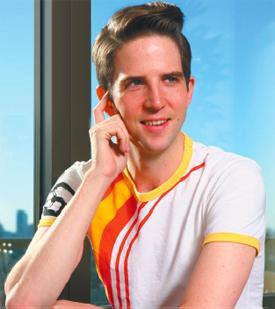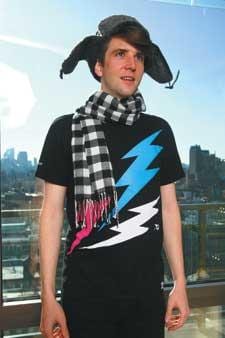
Credit: Jeffrey Eason photo
“These are love songs,” Owen Pallett speaks quietly, almost as if to himself. “This is a love story.”
He’s talking about the soon-to-be-released Heartland, a concept album about a farmer named Lewis, who lives on the fictional planet Spectrum. Lewis has a strained relationship with his creator-deity, Owen.
Heartland is the long-awaited third album from Toronto-based Pallett. It arrives on the heels of the announcement that with it, Pallett will retire his previous moniker, Final Fantasy. Effectively a band of one, Final Fantasy’s last full-length offering, He Poos Clouds, received the inaugural Polaris Prize in 2006.
Difficult to categorize, his music has always blurred the lines between classical, pop and electronic, forcing them to harmonize in a sometimes disturbing coexistence.
“But,” Pallett muses, “Heartland is completely untraditional. Untraditional even for me. It’s like nothing I have done before.”
With deep swells of emotive music and a choir-like offering of pipe organ and voice, Heartland is powerful, vulnerable and complex. Structured as a series of 12 monologues that are hymns to Lewis’s creator, Heartland is a 45-minute orchestral narrative. But it is also a string of stand-alone pop songs that highlight Pallett’s signature looped violin and voice.
Pallett is an artist who chooses to remain in touch with his fans. He is a member of his website’s discussion board, where he replies occasionally to fans’ questions and recently posted the lyrics for Heartland.
Reached by phone in New York, Pallett is nursing a hangover — a mix of sake and nostalgia.
“I was out with a couple of friends last night,” he says. “It’s this thing that happens when you drink sake. You have a couple of glasses and you feel great. And then you go to stand up, and you suddenly realize, ‘Aw, shit.’”
These are the last dregs of 2009, and he has a couple of weeks of relative quiet between the production of the album and its release. Pallett is in New York because he’s working on a film score for John Cameron Mitchell’s upcoming film Rabbit Hole. His voice is warm but tired as he talks about Heartland.
“It’s like I’ve had a partial lobotomy. I knew creating Heartland would be hard, but I didn’t know how hard. It may as well be a pornographic spread — I laid myself bare.”
Grandiose, densely layered and recorded over the better part of a year, it’s easy to imagine Heartland as a project Pallett got lost in. Pallet says that’s not too far off the mark.
“When I hear it I think it’s brilliant. I am so proud of it, but sometimes I do fear that I’ve invited ridicule. I think I’m going to have to go see a therapist before the reviews come out. I’m going to need help keeping it in perspective. It may be fictional, but there’s more of me in Heartland than anything else I’ve ever written.”
Pallett is brimming with indie cred. He’s known for a string arrangements he wrote for some of the decade’s best records — Arcade Fire’s Neon Bible, Grizzly Bear’s Yellow House, Beirut’s The Flying Club Cup, The Mountain Goats’ The Life of the World to Come, and even the Pet Shop Boys’ Yes. He’s toured with the Hidden Cameras and remixed work from Stars and Death From Above 1979.
After finishing Heartland, Pallett joined one of those bands, songwriter John Darnielle’s The Mountain Goats, on tour. He was familiar with the material, and he thought it would be a refreshing experience.
Pallett laughs sheepishly. “The Mountain Goats tour was good for me. I had a realization.” He pauses. “John is an incredible songwriter. He’s got a couple hundred songs, maybe even more. He’s lived a crazy, interesting life. Almost all those songs are autobiographical. They’re real and honest. And that is what he sings. He sings about real life experiences.”
“I have maybe 60 songs. And everything that I have done is complex and technical. And it’s always been, How do I make this more challenging? How do I make it more difficult? How do I make it more complicated?”
Pallett quietly confesses, “After Heartland, I didn’t want to write. I had no urge to write.”
“But there was something beautiful about the honesty and integrity of John’s songs. I wondered, What if I tried that? What if I wrote something autobiographical and simple? I came off The Mountain Goats tour and I started writing. Just a little bit.”
“I was so emotional and almost fragile on that tour, and I couldn’t figure it out. And then one of The Mountain Goats guys, he gave me this huge hug one morning, like this great, warm hug. And I soaked it up and it made my day. I had been missing Patrick.”
Pallett is referring to his partner, Patrick Borjal, with whom he shares a home in Toronto. Borjal is also his tour manager under the title Boyfriend Management.
“I was missing that warmth of having Patrick around. With him as my tour manager, we’ve been together in high intensity doses for like seven years now. And when I’m away, sometimes I really miss him. I’m hoping he can join me on the Heartland tour.”
Pallett laughs at the familiarity of talking about Borjal. “You know, I keep asking him to marry me. I’m normally drunk at the time, but I do keep asking him. He says no. He laughs at me and he says no.”
“I guess you come out of creating an album like Heartland emptied. I just felt done. I wish I could tell you I have some great new project on the go. I’m definitely looking forward to touring this album; there’s songs that you haven’t heard live yet. But after that, I really think I’m going to go home and rest.” Pallett smiles, “And maybe I’ll write a bit.”
Heartland.
Owen Pallett.
Jan 12 release.
Owenpalletteternal.com.

 Why you can trust Xtra
Why you can trust Xtra


